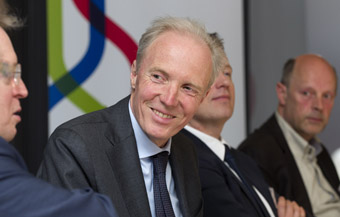April 2015
Employment and Skills High-Level Roundtable

The European Centre for Government Transformation convened the High-Level Roundtable on Employment and Skills, a meeting of top civil servants, job centre representatives, think tankers and other thought leaders in the field of skills and employment. This year’s theme was Building the Missing Skills in Europe to Rekindle Growth and Competitiveness. It brought together an eclectic mix of high-level participants from, inter alia, Belgium, France, Germany, Italy, Netherlands, Norway and the United States, who presented case studies on employment challenges in their home countries, exchanged best practice and explored common solutions to delivering more skills to the labour market. Michel Servoz, director-general for employment, social affairs and inclusion at the European Commission, led a breakout session on strategic European Commission initiatives. Stefano Scarpetta, director for employment, labour and social affairs at the Organisation for Economic Co-operation and Development (OECD), set the scene with insightful OECD evidence on the links between skills mismatch and the labour market inefficiencies. Yngvar Åsholt, director for research and analysis at the Labour and Welfare Service (Norway); Reynald Chapuis, director for innovation and corporate social responsibility at Pôle Emploi (France); Wolfgang Müller, managing director for European affairs at the Bundesagentur für Arbeit (Germany); and Fred Paling, member of the executive board of UWV (Netherlands), presented the challenges their agencies face in dealing with matching jobseekers’ skills with the demand in the labour marker – and the various ideas and solutions they are implementing to accompany this transition. Jason A. Tyszko, senior director for policy and programmes at the centre for education and workforce in the US Chamber of Commerce Foundation, provided an international perspective on these issues and discussed the US Chamber’s initiatives in addressing the skills gap and talent pipeline management. Filip Van Depoele, adviser to the director-general for education and culture at the European Commission; and Sonia Peressini, deputy head of unit for skills and qualifications at the European Commission’s directorate-general for employment, social affairs and inclusion, also weighed in, with additional thoughts on how the European Commission analyses the situation.